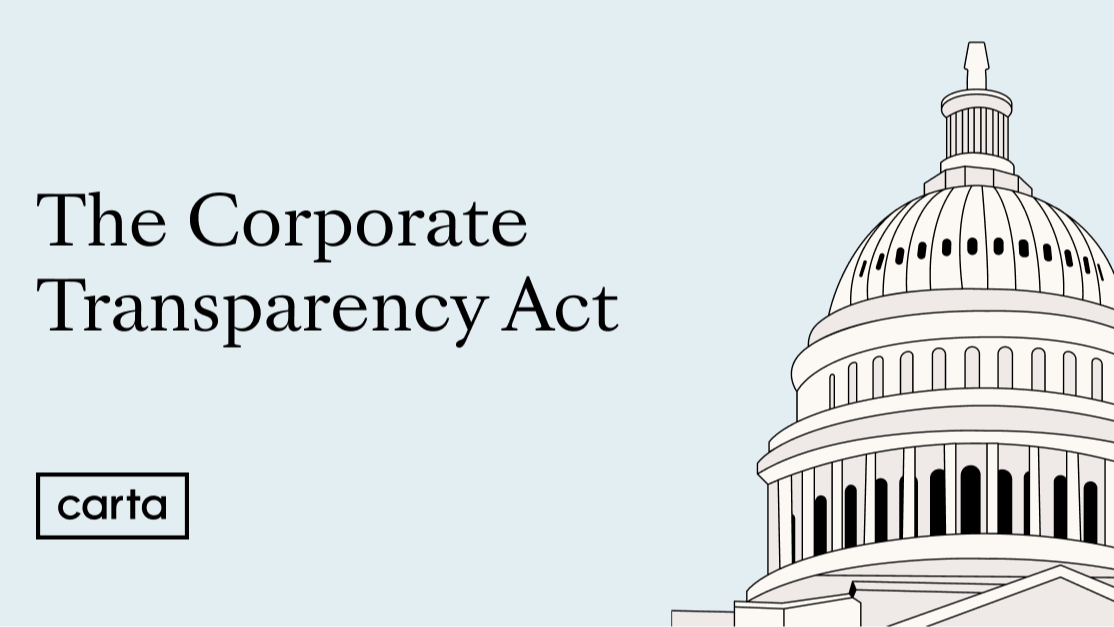Starting January 1, 2024, business entities operating in the United States are subject to new beneficial ownership information (BOI) reporting requirements under the Corporate Transparency Act (CTA) unless they qualify for an exemption.
Generally speaking, many private funds and private fund advisers will be exempt from CTA reporting requirements. But some entities within a fund’s organizational structure—as well as certain emerging fund managers—may not be covered by an exemption, and are thus subject to BOI reporting requirements. In addition, many portfolio companies will also be required to comply with BOI reporting under the CTA, particularly at the earlier stages. The CTA rules are complex, so fund managers should consult with counsel to determine if any CTA filing obligations exist with respect to their firm, funds, or portfolio investments.
What is the Corporate Transparency Act?
The CTA requires certain domestic and foreign private companies to submit information about their beneficial owners—individuals with significant control or ownership interests in the company—to the Financial Crimes Enforcement Network (FinCEN). FinCEN is a bureau established by the U.S. Treasury Department to combat money laundering, terrorist financing, and other financial crimes.
Congress passed the CTA to combat the use of shell companies to conceal the ownership of entities that facilitate illicit financial activities. BOI reporting provides law enforcement more visibility into private company ownership and could deter criminals from using them as mechanisms for illicit financial operations.
CTA reporting requirements
The CTA covers a broad array of companies that were not previously subject to any BOI reporting regime.
Which companies must report under the CTA?
The CTA’s BOI reporting requirements apply to reporting companies, which include:
-
Corporations, LLCs, LPs, and similar entities that are created by the filing of a document with the secretary of state or similar office in any U.S. state or tribal jurisdiction
-
Foreign entities registered to do business in any U.S. state or tribal jurisdiction
What information must companies report?
Reporting companies must report basic information about their company, including:
-
Company name
-
Trade names, if any
-
Current U.S. address
-
U.S. jurisdiction of formation
-
IRS taxpayer identification number (TIN) and employer identification number (EIN)
Reporting companies must also report information on their beneficial owners, including:
-
Full legal name
-
Address
-
Date of birth
-
A unique identifying number from an official document, such as:
-
U.S. or foreign passport
-
U.S. state driver’s license
-
Another official document issued by a state or local jurisdiction
-
-
The jurisdiction that issued the unique identifying number
Newly formed companies must also report similar information about the company applicants, or the people who formed the company.
In addition to reporting BOI to FinCEN, the CTA requires businesses to maintain records of the information they report to FinCEN for five years.
Who are beneficial owners?
A beneficial owner is any individual who either:
-
Owns or controls at least 25% of the ownership interests of the reporting company, or
-
Exercises substantial control over the reporting company (directly or indirectly)
Ownership interests can include equity, capital or profits interest, convertible instruments and SAFEs, and options.
Substantial control is construed broadly. An individual exercises substantial control over a reporting company in the following scenarios:
-
Serves as a senior officer (president, CEO, CFO, COO, general counsel, or similar function)
-
Possesses appointment or removal authority over senior officers or a majority of the board of directors
-
Directs, determines, or has substantial influence over important decisions
Every individual possessing substantial control over a reporting company must be reported.
Who can access BOI reported to FinCEN?
BOI will be reported to a non-public database, as opposed to information reported on Form ADV, which is publicly available. Access to BOI will be limited to federal agencies engaged in national security, intelligence, or law enforcement activities, state and local officials with court authorization, and foreign officials who meet certain criteria. Financial institutions (and their regulators) will have access to BOI to meet customer due diligence requirements.
CTA reporting exemptions
The CTA exempts 23 types of entities from BOI reporting. These exemptions generally cover entities that are already subject to substantial regulation where beneficial ownership is likely known. Determining whether an entity meets the requirements for an exemption is a facts and circumstances analysis that needs to be applied to each entity in a fund’s organizational structure.
CTA exemptions for private fund entities
The CTA will apply to all entities in a typical private fund structure—the management company, adviser or sponsor, investment funds, special purpose vehicles (SPV)—unless an exemption applies.
A number of exemptions could apply to venture capital and private equity entities if certain conditions are met.
RIAs
Investment advisers that are registered with the SEC under the Advisers Act, also referred to as RIAs, are explicitly exempt from the CTA’s reporting requirements.
While not expressly addressed in the law or implementing regulations, consensus among the legal community suggests additional entities may qualify for the RIA exemption, including:
-
Relying advisers identified on the RIA’s Form ADV
-
Entities established to serve as the general partner (GP) of a fund who meet the conditions of 2005 and 2012 SEC no-action relief, which requires the GP entity to have been formed to manage the private fund’s assets; to be subject to supervision and control of the RIA, and to be subject to SEC examination
Venture capital fund advisers
Venture capital fund advisers who meet the requirements of Section 203(l) of the Advisers Act and have filed Form ADV with the SEC (including Item 10, Schedule A, and Schedule B of Part 1A, which relates to control persons and indirect owners) are exempt from CTA reporting.
-
VC exempt reporting advisers (ERAs) must file Form ADV with the SEC and reflect their beneficial owners on Form ADV to qualify for this exemption.
-
GP entities who meet the requirements outlined in the SEC’s aforementioned no-action relief will likely be exempt.
Pooled investment vehicles (PIVs)
Private funds that qualify under section 3(c)(1) or 3(c)(7) of the Investment Company Act and are identified in the Form ADV of the investment adviser are exempt from CTA reporting requirements.
This exemption will likely apply to most funds managed by private fund advisers, but PIVs are only eligible for this exemption if the investment adviser is also exempt, either under the RIA exemption or the venture capital fund adviser exemption, and the PIV is identified on the adviser’s Form ADV.
Subsidiaries
Entities that are wholly owned or controlled, directly or indirectly, by another exempt entity (except for PIVs), are exempt from CTA reporting requirements.
Large operating companies
U.S. companies that employ more than 20 full-time employees and more than $5 million in gross receipts or sales are exempt from CTA reporting requirements.
Public companies
Public companies are exempt from CTA reporting because they are already required to file periodic reports with the SEC.
What private fund entities are not exempt?
While a private fund can qualify for a number of CTA exemptions, some entities associated with the fund may not be exempt. This will vary from fund to fund and will depend on the organizational structure of the firm and its regulatory reporting practices. Investment advisers should analyze each entity in their management structures and fund complexes to determine whether there is a CTA reporting obligation.
The following list is not exhaustive, but it highlights instances where the private fund may be subject to BOI reporting under the CTA.
Private fund adviser ERAs
The CTA expressly exempts ERAs who qualify for the venture capital fund adviser exemption, but ERAs who meet the private fund adviser exemption under section 203(m)—private fund advisers with less than $150 million in AUM—would be subject to CTA reporting requirements unless another exemption applies.
Small venture capital fund advisers & state-registered advisers
Per SEC guidance, a fund must be eligible to register with the SEC to be eligible to file with the SEC as an ERA. This means that private fund advisers with less than $25 million in assets under management will not be able to file a Form ADV with the SEC, even if they otherwise meet the criteria for an ERA exemption. In effect, this means small venture capital fund advisers would not be exempt from CTA reporting requirements.
State-registered investment advisers will also be subject to CTA reporting requirements even if they file Form ADV with a state, unless another exemption applies.
Subsidiaries of PIVs
The subsidiary exemption expressly excludes PIVs, so below-the-fund holding vehicles and SPVs are not presumptively exempt by virtue of being a subsidiary.
Holding companies
There is no categorical or flow-through exemption for upper-tier entities of private investment funds. Unless another exemption applies (such as the large operating company exemption or public company exemption), upper-tier management or holding companies may be subject to CTA reporting even if the adviser and fund-level entities are exempt.
CTA considerations for portfolio companies
Early-stage portfolio companies may also be subject to CTA reporting requirements.
Fund managers should evaluate their ownership and control interests in their portfolio investments, as such information may be required by the portfolio company for its reporting obligations under the CTA.
CTA compliance timeline
Reporting companies will be required to comply with the CTA according to when the company was formed or registered to do business:
|
Company formation date |
CTA compliance deadline |
|
Before January 1, 2024 |
By January 1, 2025 |
|
In 2024 |
90 days from incorporation date |
|
On or after January 1, 2025 |
30 days from incorporation date |
Updates to filings
After the initial filings, reporting companies will have 30 days to file any updates, corrections, or changes to previously filed BOI reports. This would include any changes to an owner’s legal name, address, or other required details.
Penalties for noncompliance
Penalties for noncompliance with CTA reporting include civil penalties of $500 per day in fines (up to $10,000) and criminal penalties of up to $10,000 and two years of imprisonment. Penalties can result from failure to file a timely updated report or from filing a false or fraudulent report. The amount of the penalty is determined by the severity of the violation, as well as the company’s history of compliance.
FinCEN has indicated it would only assess penalties for willful violations and noncompliance.
Recent developments
A federal court in Alabama found the CTA to be unconstitutional. FinCEN is prevented from enforcing the CTA against the plaintiffs to the litigation, including the 65,000 members of the National Small Business Association (NSBA) as of March 1, 2024. BOI reporting obligations for the vast majority of reporting companies remain in effect, and new businesses formed in 2024 should plan to file with FinCEN until further notice.
The federal government has appealed the Alabama decision, but the CTA has since been subjected to legal challenges in other jurisdictions. You can keep track of the latest litigation updates here.
Tips for navigating CTA compliance
-
Consult your legal counsel to determine how CTA reporting requirements apply to your firm, private fund adviser, fund entities, and portfolio companies.
-
Map out your fund structure and identify beneficial ownership and control for each entity.
-
Evaluate each entity for a possible CTA exemption.
-
If you are relying on the RIA or venture capital adviser exemption, ensure Form ADV includes required information to meet conditions of the exemption, including beneficial ownership information and private funds sponsored by the adviser.
-
Implement policies and procedures to monitor changes in beneficial ownership, control, or previously reported BOI information.
-
FinCEN has taken a narrow posture regarding CTA exemptions, so keep this in mind when considering whether a particular exemption may apply to a particular set of facts and circumstances.
Get the latest updates
For the latest updates on private market regulations, subscribe to Carta’s Policy Weekly newsletter.

